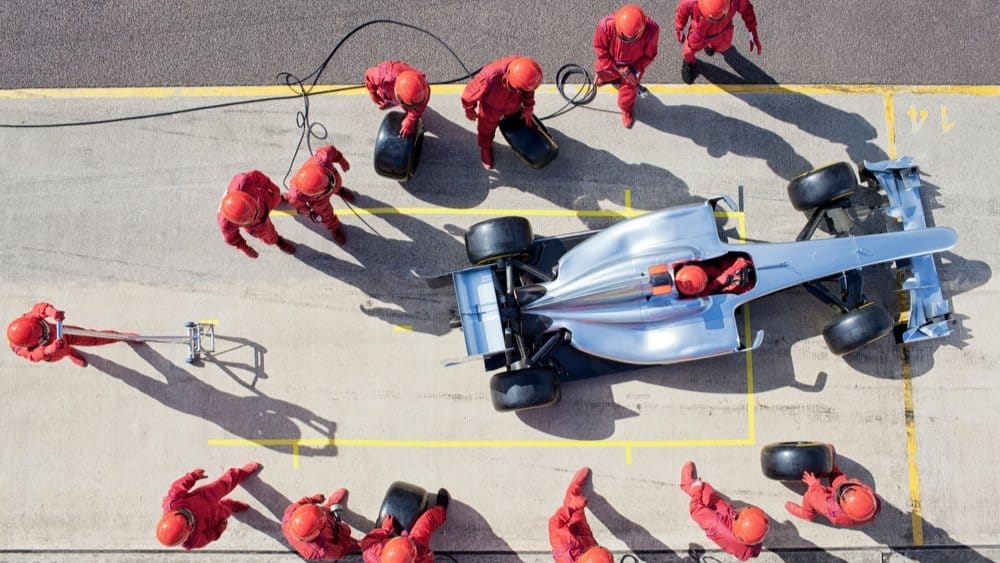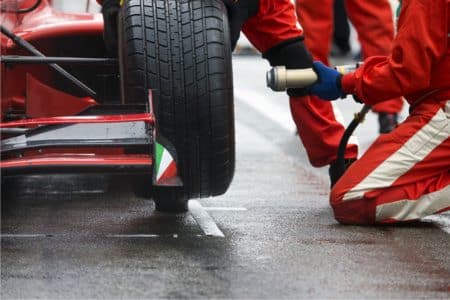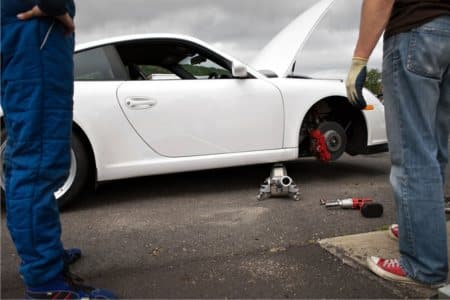
Pit crews are essential to the success of any racing team. They ensure that every aspect of the car’s performance is optimized during the race. Here, we list the top 10 types of pit crew jobs and provide detailed descriptions of their responsibilities and expected salaries.
1. Chief Mechanic
Salary: $80,000 – $120,000 per year
Job Description
The Chief Mechanic leads the pit crew and oversees all mechanical aspects of the car. They are responsible for ensuring the car is in optimal condition before and during the race, including pre-race preparations, diagnosing and fixing mechanical issues, and coordinating the team’s efforts during pit stops.
Responsibilities
- Pre-Race Preparation: The Chief Mechanic oversees the car’s setup, ensuring all components are functioning correctly, including engine tuning, suspension adjustments, and checking all mechanical parts for wear and tear.
- Race Strategy: They work closely with the race engineer to develop and execute race strategies, including determining the best times for pit stops and necessary adjustments based on race conditions.
- Pit Stop Coordination: During the race, the Chief Mechanic coordinates the pit crew, ensuring each member performs their task efficiently, which involves quick decision-making and excellent communication skills.
- Post-Race Analysis: After the race, they analyze the car’s performance and any mechanical issues that occurred, providing insights for future improvements.
Example: During a race, the Chief Mechanic might coordinate the crew to replace a damaged suspension component within minutes to get the car back on track, which involves diagnosing the problem quickly, instructing the team on the necessary repair, and ensuring the car is safe to continue racing.
2. Tire Changer

Salary: $50,000 – $70,000 per year
Job Description
Tire Changers are responsible for swiftly removing and replacing tires during pit stops. This role requires precision, speed, and the ability to work under extreme pressure. They use specialized pneumatic tools to loosen and tighten the wheel nuts, ensuring that the tires are securely fitted in the shortest time possible.
Responsibilities
- Tire Removal: Tire changers use high-speed air guns to quickly remove old tires, which involves loosening and removing the wheel nuts without damaging the tire or the car’s wheel hubs.
- Tire Installation: After removing the old tires, the new tires must be fitted accurately and securely, and the wheel nuts must be tightened to the correct torque specifications.
- Equipment Maintenance: They are also responsible for maintaining their equipment, ensuring the air guns and other tools are in perfect working condition before the race.
- Coordination with Tire Carriers: Tire Changers must work seamlessly with Tire Carriers to ensure that the right tires are always available at the right time.
Example: A Tire Changer might switch all four tires in under 12 seconds to keep the car competitive. This requires precise teamwork and coordination, as even a slight delay can cost valuable seconds and potentially affect the race outcome.
3. Tire Carrier
Salary: $40,000 – $60,000 per year
Job Description
Tire Carriers bring new tires to the car and remove the old ones during pit stops. This role demands physical strength and agility, as they must handle heavy tires quickly and efficiently. They also play a crucial role in ensuring the correct tires are used according to the race strategy.
Responsibilities
- Tire Transport: Tire Carriers are responsible for transporting the new tires from the tire warmers to the car and removing the old tires from the pit area. This must be done rapidly to minimize the time the car spends stationary.
- Tire Identification: Based on the team’s strategy and current race conditions, they must ensure that the correct tires (soft, medium, or hard compound) are ready.
- Tire Inspection: Before fitting, the new tires are inspected to ensure they are free of defects, properly inflated, and at the correct temperature.
- Coordination with Tire Changers: They work closely with Tire Changers to ensure a seamless tire change process. Timing and coordination are critical to avoid any delays.
Example: A Tire Carrier ensures that the right tires (soft, medium, or hard compound) are ready for the Tire Changers based on the race strategy, which involves understanding the team’s strategy, quickly identifying and delivering the correct tires, and removing the used tires efficiently to keep the pit area clear and safe.
4. Fueler
Salary: $45,000 – $65,000 per year
Job Description
The Fueler is responsible for refueling the car during pit stops. This job requires utmost precision to avoid overfilling or underfilling and to ensure safety. The Fueler must handle highly flammable fuel with care, using specialized equipment to transfer the fuel quickly and efficiently.
Responsibilities
- Fuel Handling: They manage the fuel rig connected to the car during pit stops, which involves controlling fuel flow to ensure the exact amount is delivered.
- Safety Protocols: The Fueler must adhere to strict safety guidelines to prevent accidents. These include wearing protective gear and ensuring that the fuel rig is adequately maintained and grounded to avoid static electricity.
- Coordination: They work closely with the rest of the pit crew to ensure that the refueling process is synchronized with other pit stop activities, such as tire changes and mechanical adjustments.
- Fuel Management: Monitoring the fuel levels and consumption throughout the race to adjust strategies as needed.
Example: A Fueler might fill the car with exactly 50 liters of fuel in just a few seconds without spilling, ensuring optimal race performance and adherence to safety protocols.
5. Jack Operator

Salary: $40,000 – $60,000 per year
Job Description
The Jack Operator uses a specialized jack to lift and lower the car during pit stops, allowing other crew members to access the tires and underside of the vehicle. The role requires strength, precision, and timing, as lifting and lowering the car must be done quickly and safely.
Responsibilities
- Front and Rear Jacks: The Jack Operator is responsible for front and rear jacks. They must accurately position the jacks under the car and operate them swiftly to lift it off the ground.
- Timing: Perfect timing is crucial. The Jack Operator must lift the car when it stops and lowers it immediately after the tires are changed to minimize the pit stop duration.
- Maintenance: Keeping the jacks in top condition, ensuring they are well-lubricated and functioning correctly before the race.
- Backup Role: In case of equipment failure, be prepared to quickly switch to a backup jack.
Example: The Jack Operator might lift the car in under 2 seconds and lower it just as quickly after the tires are changed, minimizing pit stop time and ensuring the car can return to the race without delay.
6. Spotter
Salary: $55,000 – $75,000 per year
Job Description
Spotters provide real-time information about track conditions, car positions, and competitor strategies. They have a vantage point around the track to monitor the race and communicate crucial information to the driver and pit crew.
Responsibilities
- Track Monitoring: Keeping an eye on the entire track to spot any hazards, accidents, or changes in weather conditions that could affect the race.
- Communication: Relaying information to the driver and pit crew in real-time, providing updates on the positions of competitors and any strategic moves they should make.
- Strategic Input: Helping to make informed decisions about when to pit, overtake, or defend a position based on their observations.
- Coordination: Working closely with the race engineer and driver to ensure all strategies are aligned and communicated effectively.
Example: A Spotter might alert the driver to an upcoming hazard on the track, allowing for timely evasive action and potentially avoiding a crash. This real-time information is crucial for making strategic decisions that could affect the race outcome. A good spotter is one of the most crucial types of pit crew jobs.
7. Data Analyst
Salary: $70,000 – $90,000 per year
Job Description
Data Analysts are crucial for interpreting vast amounts of data generated by the car and the race track. They use advanced software and analytical techniques to provide insights that help optimize car performance and race strategy. Their sports analytics role involves continuous monitoring and analysis before, during, and after the race to inform the team’s decisions.
Responsibilities
- Data Collection: Gathering data from various sensors on the car, including telemetry data, tire pressure and temperature sensors, and aerodynamic performance indicators.
- Data Analysis: Using statistical tools and software to analyze data trends, identify performance issues, and suggest improvements, which includes evaluating tire wear patterns, fuel consumption rates, and engine performance metrics.
- Reporting: Create detailed reports and real-time dashboards summarizing key findings for the race engineers and team strategists.
- Strategic Recommendations: Providing actionable insights to optimize pit stop timing, tire choices, fuel strategies, and other critical decisions that can impact race performance.
Example: A Data Analyst might analyze tire wear data to suggest the best time for a pit stop, which optimizes the car’s performance by ensuring that tire changes are made before performance drops significantly, thus maintaining optimal grip and speed throughout the race, one of the most crucial types of pit crew jobs.
8. Car Controller (Lollipop Man)
Salary: $45,000 – $65,000 per year
Job Description
The Car Controller, traditionally known as the Lollipop Man, signals the driver during pit stops. This role ensures that the driver stops in the correct position and is safely released back into the race. Precision and excellent communication are key, as mistakes can lead to dangerous situations or time penalties.
Responsibilities
- Stop and Go Signals: Using a lollipop-shaped sign or an electronic system to signal the driver when to stop and when to go, ensuring the car is positioned accurately in the pit box.
- Safety Checks: Ensuring that all pit crew members have completed their tasks and that no tools or personnel are in the way before signaling the driver to leave.
- Traffic Monitoring: Watching the pit lane traffic to ensure the car can re-enter the race without colliding with other vehicles or violating pit lane rules.
- Communication: Coordinating with the pit crew chief and other team members to ensure smooth and safe pit stops.
Example: The Car Controller uses hand signals and a lollipop sign to guide the driver into the exact stopping position for efficient tire changes. Then, the controller checks to ensure all tires are securely fastened before allowing the driver to exit the pit safely.
9. Engine Specialist
Salary: $70,000 – $100,000 per year
Job Description
Engine Specialists are focused on the performance and maintenance of the car’s engine. They ensure the engine runs smoothly and efficiently throughout the race by making necessary adjustments based on real-time data and track conditions. Their work is critical for maximizing power output while maintaining reliability.
Responsibilities
- Engine Tuning: Adjusting the engine settings to optimize performance based on track conditions, weather, and the specific demands of each race circuit.
- Diagnostics: Using diagnostic tools to identify and troubleshoot any engine issues before they become critical problems during the race.
- Maintenance: Performing routine maintenance and repairs on the engine components to ensure reliability and longevity.
- Performance Monitoring: Continuously monitor engine performance data during the race to detect anomalies and make adjustments as needed.
Example: An Engine Specialist might adjust the engine settings for optimal performance based on track conditions and weather, such as modifying the fuel-air mixture to enhance efficiency at high altitudes or tweaking the turbocharger settings for better acceleration on a particular circuit.
10. Aerodynamics Specialist

Salary: $65,000 – $85,000 per year
Job Description
Aerodynamics Specialists are crucial in optimizing a race car’s performance by focusing on its body and wing setup to enhance airflow and reduce drag. This role requires a deep understanding of fluid dynamics and the ability to translate theoretical concepts into practical adjustments that can be made on the race car.
Responsibilities
- Aerodynamic Testing: Conducting wind tunnel tests and utilizing Computational Fluid Dynamics (CFD) simulations to analyze airflow over the car’s body and components.
- Data Analysis: Interpreting aerodynamic data to identify areas where improvements can be made, which involves understanding how different adjustments affect the car’s stability, speed, and handling.
- Component Design: Designing and testing new aerodynamic components such as front and rear wings, diffusers, and body panels to improve the car’s performance.
- Trackside Adjustments: Making real-time adjustments to the car’s aerodynamic setup during practice sessions and races based on driver feedback and performance data.
- Collaboration: Working closely with other engineers and the driver to ensure aerodynamic changes align with overall car performance goals and race strategy.
Example: An Aerodynamics Specialist might adjust the rear wing angle to improve downforce, enhancing the car’s handling and speed on corners. For instance, increasing the rear wing’s angle of attack can provide more downforce, which helps the car maintain higher speeds through turns without losing grip, one of the most underappreciated types of pit crew jobs.
How to Become a Pit Crew Member
Breaking into the world of pit crew roles in motorsports requires a blend of education, training, and hands-on experience. Here’s a brief guide on how to start your career in this high-speed, high-stakes environment:
1. Obtain Relevant Education
Degrees: Consider pursuing degrees in mechanical engineering, automotive technology, or a related field. These provide a strong foundation in the principles needed for various types of pit crew jobs.
2. Gain Hands-On Experience
Internships: Participate in internships with racing teams or automotive workshops. Practical experience is crucial.
Motorsport Schools: Enroll in specialized motorsport schools that offer training programs for aspiring pit crew members.
3. Specialize and Certify
Certifications: Obtain certifications relevant to specific types of pit crew jobs (e.g., tire changing, fueling).
Workshops and Training: Attend workshops and training sessions to stay updated with the latest techniques and technologies in motorsports.
4. Start at the Grassroots
Local Races: Begin your career by working with local racing teams. This grassroots experience is invaluable and often a stepping stone to higher levels of competition.
Network: Build a network within the motorsports community. Connections can open doors to opportunities in larger racing teams.
5. Apply for Jobs
Jobs In Sports: Utilize job platforms like Jobs in Sports to find listings for the various types of pit crew jobs. Consider their membership options for access to exclusive job listings and personalized support in your job search.
By following these steps, you can build the skills and experience necessary to become a vital member of a racing team’s pit crew, contributing to their success on the track.
Where to Get a Pit Crew Job
Each type of pit crew job, from the Chief Mechanic to the Aerodynamics Specialist, is vital in ensuring the car performs optimally, and pit stops are executed flawlessly.
If you’re passionate about the types of pit crew jobs and aspire to be part of such high-performance teams, consider exploring the opportunities at Jobs in Sports. With a free membership, you can add your resume to the database and receive invitations to apply from employers looking for talent like yours. For those seeking a more in-depth job search experience, a paid membership offers complete access, including sports job database searches, detailed job descriptions, and more.
Sign up for Jobs in Sports today and take the first step towards landing your dream job in the sports industry. Whether you’re just starting or looking to advance your career, Jobs in Sports provides the tools and resources you need to succeed.





